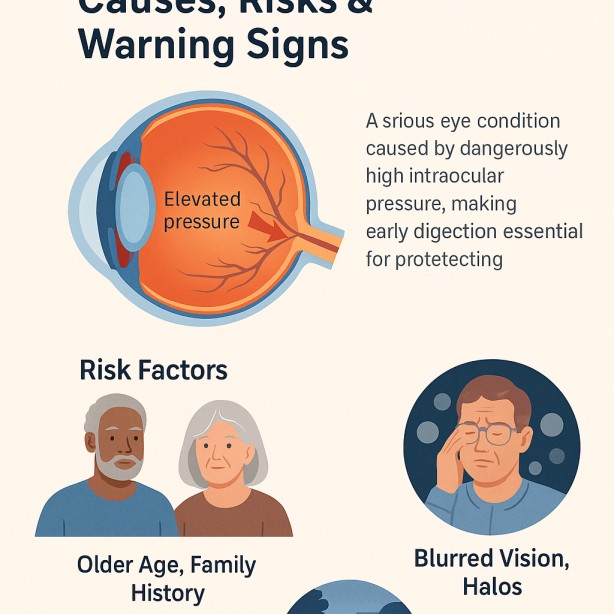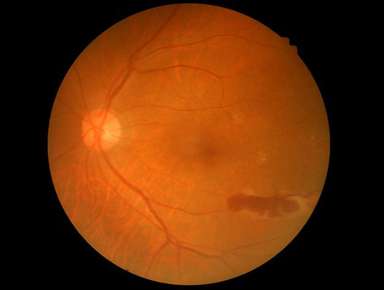What Is Glaucoma? Causes, Risks & Warning Signs
What Is Glaucoma? Causes and Risks Explained
Glaucoma is a serious eye condition caused by dangerously high intraocular pressure (pressure inside the eye). This elevated pressure occurs when fluid builds up in the eye, unable to drain properly. When left untreated, increased intraocular pressure damages the optic nerve, progressively leading to permanent vision loss and potential blindness.
Glaucoma Statistics: Prevalence and Awareness in the US
Glaucoma affects approximately 3 million Americans, yet remarkably, only half know they have this sight-threatening condition. Among adults over 60, glaucoma ranks as a leading cause of blindness in the United States. The condition’s greatest danger lies in its silent progression—vision loss occurs so gradually that most patients don’t notice symptoms until significant, irreversible damage has already occurred.
Glaucoma Symptoms: Early Signs and Silent Progression
Glaucoma symptoms vary significantly depending on the type you have. Open-angle glaucoma—the most common form—typically shows no early warning signs, earning it the nickname “silent thief of sight.” As optic nerve damage progresses, patients may experience:
- Peripheral vision loss (blank spots in side vision)
- Tunnel vision in advanced stages
- Gradual narrowing of the visual field.
Acute Angle-Closure Glaucoma: Emergency Symptoms and Treatment
Acute angle-closure glaucoma represents a true medical emergency that develops rapidly and can cause permanent blindness within hours if left untreated. Seek immediate emergency care if you experience any of these warning signs:
- Sudden severe eye pain
- Rapid vision loss or blurry vision
- Intense headache
- Nausea and vomiting
- Halos around lights (rainbow-colored rings)
- Red, swollen eye
Call 911 or visit your nearest emergency room immediately—every minute counts in preserving your vision.
Glaucoma Risk Factors: Who Is Most at Risk?
Several risk factors for glaucoma significantly increase your likelihood of developing this sight-threatening condition:
Age-Related Risks:
- Adults over 60 years old (highest risk for all types)
- Adults over 40 years old (increased risk for angle-closure glaucoma)
Health and Genetic Factors:
- Family history of glaucoma
- African-American, Hispanic, or Asian descent
- Diabetes, heart disease, or high blood pressure
- Thyroid disorders
- Pre-existing elevated eye pressure
Eye-Related Conditions:
- Previous eye injuries or inflammation
- Retinal detachment or eye tumors
- Long-term corticosteroid use
Understanding your risk profile helps determine how frequently you should receive comprehensive eye exams
When to See an Eye Doctor for Glaucoma Screening
Early glaucoma detection through regular comprehensive eye exams remains your best defense against vision loss. Professional eye pressure testing and optic nerve evaluation can identify glaucoma before irreversible damage occurs, making timely treatment possible.
Glaucoma Examination Guidelines: How Often Should You Get Tested?
The American Academy of Ophthalmology provides clear guidelines for glaucoma screening schedules:
Standard Screening Timeline:
- First comprehensive exam at age 40
- Every 3-5 years for low-risk individuals
- Every 1-2 years for adults over 60
- More frequent exams for high-risk ethnic groups
High-risk individuals (African-American, Hispanic, or those with a family history) may need earlier and more frequent screening to ensure optimal eye health protection.
Final Warning: Protect Your Vision from Glaucoma
Schedule an eye appointment promptly if you notice any gradual vision changes. For sudden vision loss or symptoms of acute angle-closure glaucoma, seek emergency eye care immediately—don’t wait.
Remember: Untreated glaucoma leads to permanent blindness. Early intervention saves sight.
Are You at Risk for Glaucoma? Book Your Eye Screening with Cannon EyeCare Now and Keep Your Sight Safe.
FAQs
-
What is glaucoma and how does it affect my vision?
Glaucoma is a group of eye conditions that damage the optic nerve, often due to high eye pressure, leading to gradual, irreversible vision loss if untreated
-
How do I know if I have glaucoma symptoms?
-
Who is most at risk for developing glaucoma?
-
When should I get screened for glaucoma?
-
Why is early detection of glaucoma important?
-
How is glaucoma treated and can it be cured?
-
What should I do if I experience sudden eye pain or vision loss?
-
What are the different types of glaucoma?
-
Can exercise help prevent or manage glaucoma?
-
Are there lifestyle changes that can protect my eyes from glaucoma?
-
What happens if I forget to use my glaucoma eye drops?
-
Can children or young adults get glaucoma?




